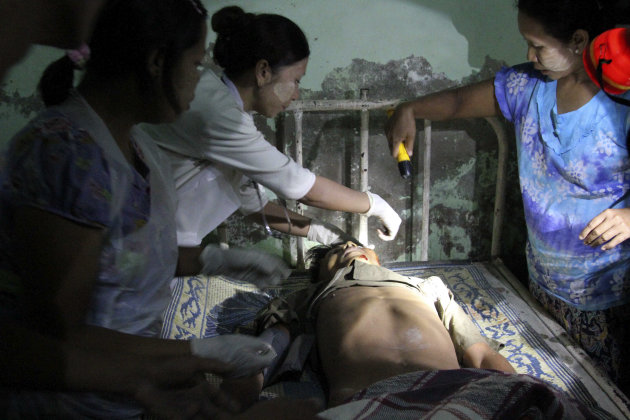Associated Press/Khin Maung Win - In this Oct. 25, 2012 photo, a Rakhine
refugee receives medical treatment at Kyauktaw hospital in Kyauktaw,
Rakhine State, western Myanmar. At least 56 people have been killed
SITTWE, Myanmar (AP) — Myanmar's government has appealed for peace in the western state of Rakhine, warning that ethnic violence
there that has taken at least 56 lives in recent days risks harming the
country's reputation as it seeks to install democratic rule.
The mob violence pitting the Buddhist Rakhine community against the Muslim Rohingya has seen entire villages torched and has drawn international calls for government intervention.
"The
army, police, and authorities in cooperation with local people will try
to restore peace and stability and will take legal action against any
individual or organization that is trying to instigate the unrest," said
a statement from the office of President Thein Sein published Friday in
the state-run Myanma Ahlin newspaper.
Since
Sunday, 25 men and 31 women have been reported dead and 60 men and four
women injured in the violence in four Rakhine townships, state government spokesman Win Myaing said Thursday. He did not break down the casualties by ethnic group.
The government said 1,948 houses and 8 religious buildings had been destroyed through Wednesday.
"As
the international community is closely watching Myanmar's democratic
transition, such unrest could tarnish the image of the country," the
presidential statement said.
In June, ethnic violence in the state
left at least 90 people dead and destroyed more than 3,000 homes. About
75,000 have been living in refugee camps ever since.Curfews in place in some areas since then have been expanded due to the latest violence, but tensions have stayed high in part because the government has failed to find any long-term solution other than segregating the communities.
The long-brewing conflict is rooted in a dispute over the Muslim residents' origin. Although many Rohingya have lived in Myanmar for generations, they are widely denigrated as intruders who came from neighboring Bangladesh to steal scarce land.
The
U.N. estimates their population in Myanmar at 800,000. But the
government does not count them as one of the country's 135 ethnic
groups, and so — like neighboring Bangladesh — denies them citizenship.
Human rights groups say racism also plays a role: Many Rohingya, who
speak a Bengali dialect and resemble Muslim Bangladeshis, have darker
skin and are heavily discriminated against.A statement issued late Thursday by the office of U.N. Secretary General Ban Ki-moon described the latest violence as "deeply troubling."
"The widening mistrust between the communities is being exploited by militant and criminal elements to cause large-scale loss of human lives, material destruction, displaced families as well as fear, humiliation and hatred affecting the people from all walks of life," it said.
Ban called on Myanmar authorities "to take urgent and effective action to bring under control all cases of lawlessness."
"The vigilante attacks, targeted threats and extremist rhetoric must be stopped. If this is not done, the fabric of social order could be irreparably damaged and the reform and opening up process being currently pursued by the government is likely to be jeopardized," said Ban.
In Washington, State Department spokeswoman Victoria Nuland said the U.S. was deeply concerned about the reports and urged restraint.
An Associated Press
photographer who traveled to Kyauktaw, one of the affected townships 45
kilometers (75 miles) north of the Rakhine capital of Sittwe, said he
saw 11 wounded people brought by ambulance Thursday to the local 25-bed
hospital, most with gunshot wounds.
One
was declared dead after arrival. All the victims being treated were
Rakhine, but that could reflect an inability or unwillingness of
Rohingya victims to be treated there.
A
volunteer at the hospital, Min Oo, said by telephone that five bodies,
including one of a woman, had also been brought there. He said the
injured persons were brought by boat from Kyauktaw town 16 kilometers
(10 miles) away.
Accounts by
Rakhine villagers in the area suggested great confusion and tension. The
villager said that when groups of Rakhine and the Rohingya had a
confrontation, government soldiers shot into a crowd of Rakhine, even
though, according to his claim, it had been dispersing. The villager
would not give his name for fear of violent reprisals.
"We feel
very unsafe because soldiers are not protecting us but protecting the
Muslim villages. They shot the Rakhine people when people got near
Muslim villages," said Aung Than, a resident of Kyauktaw township, 74
kilometers (46 miles) north of Sittwe.There have been concerns in the past that soldiers were failing to protect the Rohingya community, but the Rakhine villager's account hints that Myanmar's military may have been defending the Rohingya in this case.
The
crisis has proven a major challenge to Thein Sein's government and to
opposition leader and Nobel peace laureate Aung San Suu Kyi, who has
been criticized by some outsiders as failing to speak out strongly
against what they see as repression of the Rohingya.
Associated Press writer Matthew Pennington in Washington contributed to this report.

No comments:
Post a Comment